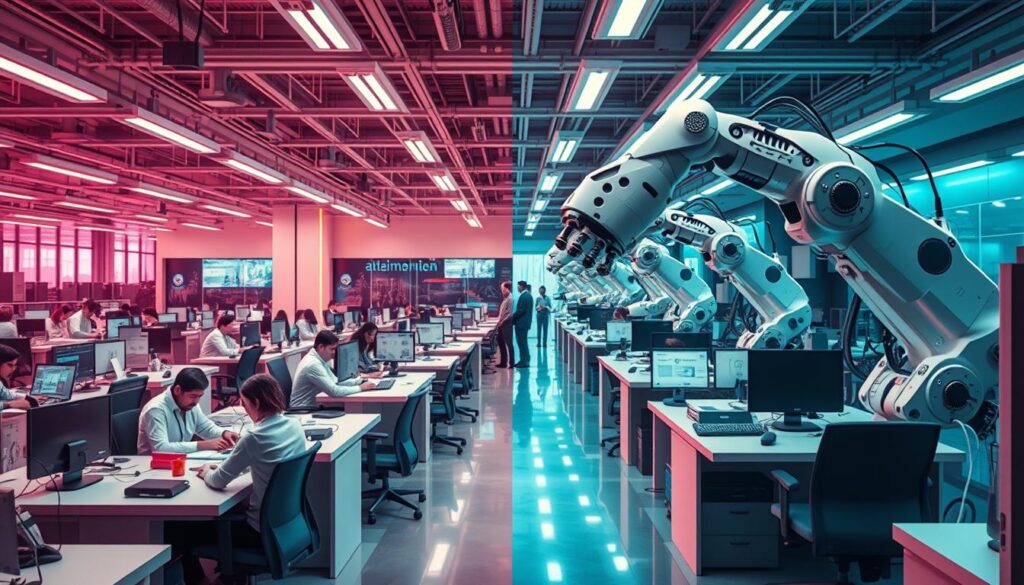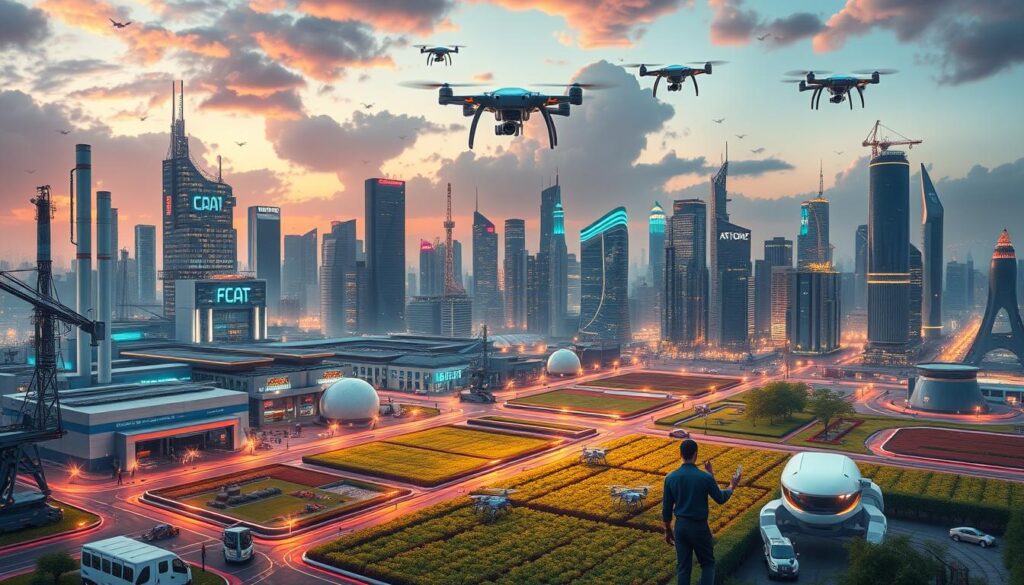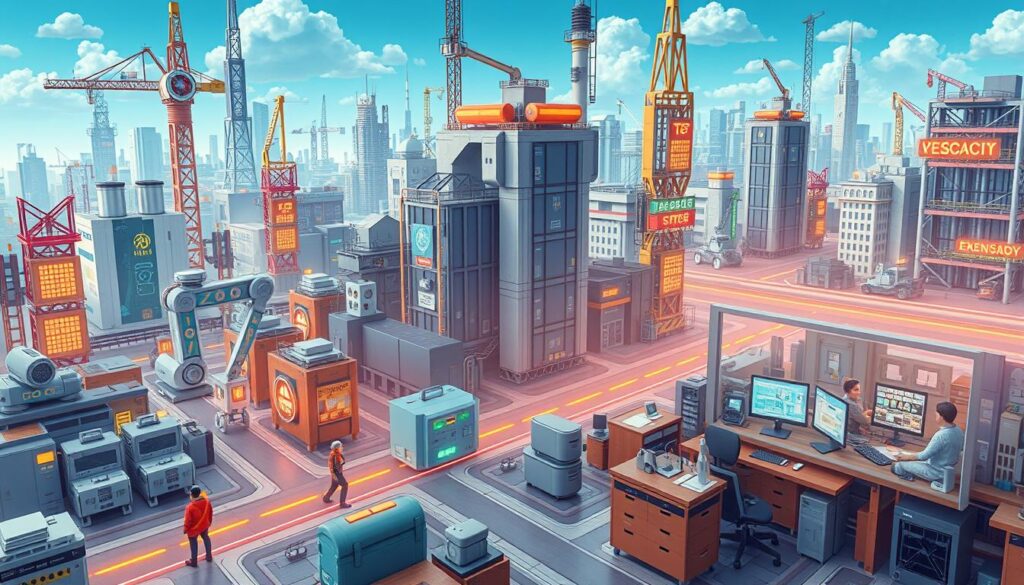The world is quickly adopting artificial intelligence (AI), changing how we work. In India, this change is big, affecting jobs and how we do them. AI’s role in job loss is a big worry, but it also brings new chances for work.

Key Takeaways
- AI is rapidly transforming industries and job roles in India, leading to job displacement.
- Automation and AI-powered technologies are replacing certain tasks and jobs, particularly those that involve repetitive or manual labor.
- New job opportunities are emerging in the AI-powered economy, requiring reskilling and upskilling of the workforce.
- Ethical considerations around AI and job displacement must be addressed to ensure a fair and inclusive future of work.
- Individuals and organizations in India need to adapt to the evolving AI-driven job market by embracing lifelong learning and workforce development strategies.
Understanding the Rise of Artificial Intelligence
The fast growth of artificial intelligence (AI) has changed how we do things and what industries we have. AI is a part of computer science that makes systems smart like humans. It’s key in today’s tech world.
What is AI and How Does it Work?
AI technology uses many methods, like machine learning, natural language processing, and computer vision. AI systems look at data, find patterns, and make choices or predictions.
Machine learning is a big part of AI. It lets computers get better with practice, without being told how. Natural language processing helps AI understand and create human language. Computer vision lets AI see and analyze pictures.
AI’s Capabilities and Limitations
AI applications can do many things well, like recognizing images, translating languages, and predicting things. But, AI has its limits. It struggles with tasks that need common sense, feeling emotions, or handling new situations.
| AI Capabilities | AI Limitations |
|---|---|
| Image and speech recognition Natural language processing Predictive analytics Autonomous decision making | Lack of common sense reasoning Difficulty adapting to novel situations Inability to fully understand complex social and emotional contexts Potential for bias and errors in decision making |
As AI technology gets better, it will change our lives more. It will affect many industries and jobs. Knowing what AI can and can’t do is important. It helps us understand the tech world and its impact on work.
Industries Impacted by AI and Job Displacement
The rise of artificial intelligence (AI) and automation is changing many industries. This change is causing job losses across different sectors. From manufacturing to healthcare, AI is transforming the job market.
In manufacturing, AI robots and automation are taking over jobs. This includes tasks like assembly line work and quality control. As AI gets better, more jobs in manufacturing will be lost.
The customer service industry is also changing. AI chatbots and virtual assistants are now handling many tasks. This means fewer jobs for call center agents and customer support staff.
Transportation is being transformed by AI too. Autonomous vehicles and smart logistics systems are emerging. Jobs like truck driving and taxi services are at risk of being automated.
Even healthcare is feeling the impact of AI. Automated diagnostic systems and robotic surgery are becoming common. This could lead to fewer jobs for radiologists and medical assistants.
“The impact of AI on the job market is undeniable, and it’s crucial for workers to stay ahead of the curve by acquiring new skills and adapting to the changing landscape.”
As AI-driven industries evolve, workers need to keep up. It’s important to learn new skills and adapt to the changing job market. Reskilling and upskilling will help individuals stay competitive.

| Industry | Impact of AI | Jobs at Risk |
|---|---|---|
| Manufacturing | AI-powered robots and automation | Assembly line work, material handling, quality control |
| Customer Service | AI-powered chatbots and virtual assistants | Call center agents, front-line customer support |
| Transportation | Autonomous vehicles and smart logistics | Truck driving, taxi services, delivery |
| Healthcare | Automated diagnostic systems, robotic surgery, AI-powered decision support | Radiologists, medical assistants |
AI and Job Displacement: The Workforce Reality
Artificial intelligence (AI) is changing the workforce in big ways. Some jobs are at risk of being automated, while new ones are popping up. It’s important for workers to know what’s coming.
Jobs at Risk Due to Automation
Jobs that are repetitive and follow strict rules are most at risk. This includes data entry, customer service, and assembly line work. AI can do these tasks better and faster than humans.
New Job Opportunities in the AI Era
But AI also brings new job chances. Fields like data science, machine learning, and AI engineering are booming. These jobs require skills that AI can’t easily replace.
To keep up, workers need to be ready to learn new things. Getting new skills can help you move into these exciting fields.
| Jobs at Risk | New Job Opportunities |
|---|---|
| Data Entry | Data Scientist |
| Customer Service | Machine Learning Engineer |
| Assembly Line Work | AI Architect |

“As AI continues to transform the workforce, the key to success will be the ability to adapt and learn new skills. Those who embrace lifelong learning will be best positioned to thrive in the changing job market.”
Reskilling and Upskilling for the Future
The job market is changing fast with the rise of artificial intelligence. Workers need to keep learning new skills to stay ahead. Lifelong learning is key in this AI era, where job requirements keep shifting.
Adapting to the AI-Driven Job Market
To succeed in the AI job market, you must be proactive in learning new skills. You’ll need both technical skills in AI and digital tech, and soft skills like critical thinking and problem-solving.
- Identify in-demand skills: Research the skills and competencies that are becoming increasingly valuable in your industry or the fields you’re interested in.
- Embrace lifelong learning: Commit to continuous skill development through online courses, workshops, or certification programs.
- Leverage AI tools: Utilize AI-powered learning platforms and tools to enhance your skill development and stay up-to-date with the latest trends.
- Seek out mentorship: Connect with experienced professionals who can provide guidance and insights on navigating the evolving workforce.
By reskilling and upskilling, you can be ready for success in the AI-driven job market. This way, you can adapt to the changing workforce demands.
“The future belongs to those who learn more skills and combine them in creative ways.” – Robert Greene
AI and Job Displacement: Ethical Considerations
Artificial intelligence (AI) is becoming more common, raising important ethical questions. We need to think carefully about how it affects jobs. It’s important to make sure everyone benefits from new technology.
AI could make some jobs disappear, which might hurt certain groups more. This could make our society more divided. We need to find ways to help those who might lose their jobs.
Also, we must make sure AI is developed and used responsibly. We should follow rules like being open, accountable, and fair. Working together, we can create rules that help everyone, not just a few.
FAQ
What is AI and how does it work?
Artificial Intelligence (AI) is a field that creates systems that can think like humans. It can learn, solve problems, and make decisions. AI uses data, finds patterns, and makes predictions or decisions with algorithms.
What are the capabilities and limitations of AI?
AI can do many things like machine learning and natural language processing. It can recognize images, translate languages, and predict things. But, AI needs lots of data and can be biased. It also can’t understand emotions or context like humans do.
Which industries are being impacted by AI and job displacement?
AI is changing many industries, like manufacturing, customer service, and healthcare. It’s making some jobs obsolete by automating tasks.
What jobs are at risk due to AI and automation?
Jobs that are repetitive or routine are at risk, like data entry and customer service. Even jobs that need thinking skills, like accounting, are seeing AI take over some tasks.
What new job opportunities are emerging in the AI era?
New jobs are coming up, like data scientists and AI engineers. These roles involve working with AI systems and thinking about their ethics.
How can individuals adapt to the AI-driven job market?
To keep up with AI, people need to learn new skills. This means taking online courses or getting certifications. It helps them stay competitive in the future job market.
What are the ethical considerations surrounding AI and job displacement?
AI’s impact on jobs raises big ethical questions. We need to think about fairness, how it affects inequality, and making sure AI benefits everyone. It’s important to develop and use AI responsibly.